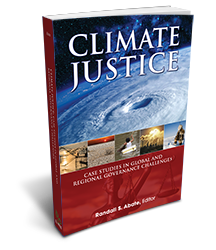
The climate justice movement is concerned with the fact that certain peoples are disproportionately burdened and affected by climate change and, as a corollary to that, considers whether impacted peoples have the opportunity to participate in the development of the legal and political response to climate change.
In a new book chapter, "Justice in an Unconventional World: First Nations' Treaty Rights and Procedural Climate Justice in Alberta's Oil Sands," Assistant Professor Cameron Jefferies explores oil sands development in the Treaty 8 region and explores the extent to which the constitutionally protected duty to consult and accommodate First Nations and/or legislated environmental impact assessment processes can be more meaningfully engaged to respond to this region's climate justice issues.
Climate Justice: Case Studies in Global and Regional Governance Challenges is edited by Randall S. Abate, a Professor of Law at the Florida Agricultural and Mechanical University College of Law, and published by the Environmental Law Institute.